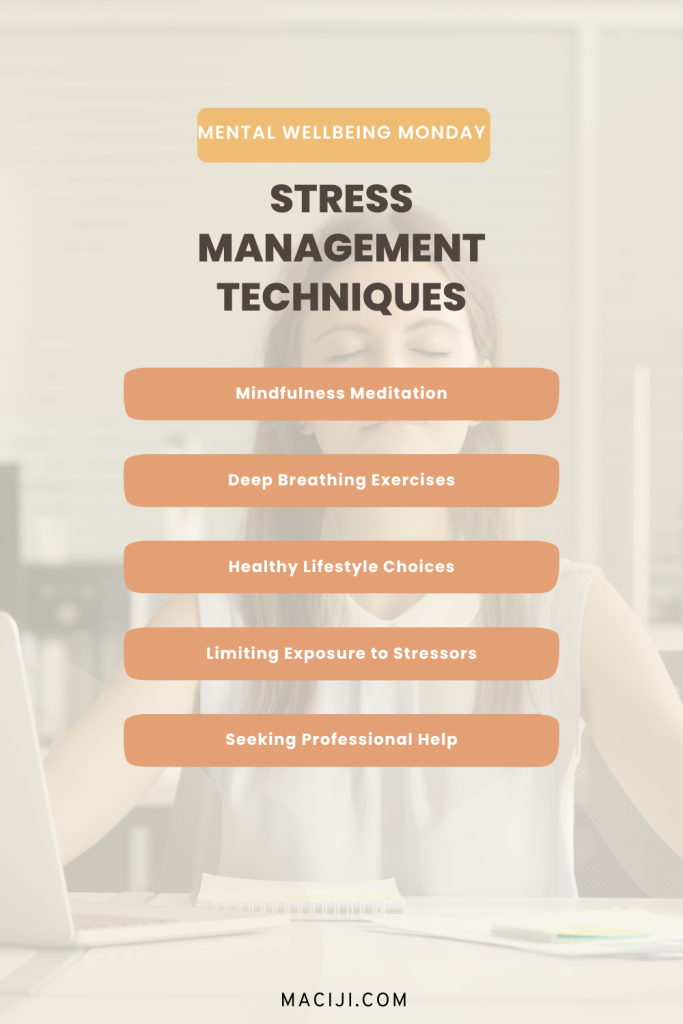In today’s fast-paced world, stress has become an essential part of existence. Everyone encounters stress occasionally, whether it’s because of their jobs, relationships, finances, or health. The important thing is how we handle and deal with it, though. We can get through difficult situations and keep our physical, mental, and emotional health by practicing effective stress management practices. Here, we examine many methods for successfully handling stress:

Mindfulness Meditation
Paying attention to the current moment without passing judgment is the practice of mindfulness meditation. By encouraging relaxation and raising awareness, it can aid in lowering stress. Regular mindfulness practice can help you develop a more composed attitude and keep your sense of reality in the face of chaos.
Deep Breathing Exercises
Deep breathing techniques, such diaphragmatic breathing or belly breathing, can trigger the relaxation response in the body. It is possible to reduce stress and anxiety, as well as your heart rate and muscle tension, by paying attention to your breathing and taking slow, deep breaths.
Regular Exercise
Physical activity has positive effects on your emotional and physical health. Frequent exercise causes the body to release endorphins, which are neurotransmitters that have a relaxing effect. Find things you enjoy doing and work them into your schedule, whether it’s taking a brisk walk, going for a run, or doing yoga.
Choosing a Healthier Lifestyle
You can manage stress more effectively if you lead a healthy lifestyle. This entails maintaining a healthy diet, getting adequate rest, and abstaining from excessive alcohol and caffeine use. You can become more resilient to challenges by giving your body the nourishment it needs and making restful sleep a priority.
Time Management Skills
Stress levels can be lowered, and overwhelming feelings can be avoided with good time management. Divide your to-do list into smaller sections, assign responsibilities as needed, and prioritize your tasks. Having a sense of control and balance in your life can be attained by setting reasonable boundaries and goals.
Social Support
Having a solid social network is essential for stress management. Seek out friends, family, or support groups for emotional support and encouragement. Talking to people you can trust about your feelings and thoughts might help you get perspective and reduce stress.
Limiting Exposure to Stressors
You can take steps to reduce your exposure to stressors, even if it might not always be possible to completely avoid stressful circumstances. This could be establishing boundaries in unhealthy relationships, putting a time limit on how much time is spent on social media reading the news or maintaining a calm atmosphere at home.
Mindfulness-Based Stress Reduction (MBSR)
To help people better manage their stress, the Mindfulness-Based Stress Reduction (MBSR) program integrates mindfulness meditation, yoga, and awareness of body sensations. Participants gain more resilience and inner serenity via practice and guided instruction.
Cognitive-behavioural Techniques
The goal of cognitive-behavioural therapy is to recognize and interrupt harmful thought patterns that fuel tension and worry. You may lessen the negative effects of stress on your mental health by changing the way you see things and substituting illogical ideas for more sensible ones.
Seeking Professional Help
Don’t be afraid to ask for assistance from a mental health professional if you’re finding it difficult to manage your stress on your own. Depending on your needs, therapy, counselling, or medication may help address underlying problems and create coping.
It takes effective stress management to keep a balanced and healthy existence. Through the integration of diverse approaches and strategies into your everyday routine, you can cultivate resilience, improve your overall well-being, and more adeptly negotiate life’s obstacles. Keep in mind that stress management is an ongoing process, so along the way, practice self-care and have patience with yourself.